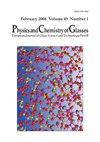Network-forming oxides with non-centrosymmetric structural groups – diffraction results on molybdate and tellurite glasses
IF 0.6
4区 材料科学
Q4 CHEMISTRY, PHYSICAL
Physics and Chemistry of Glasses-European Journal of Glass Science and Technology Part B
Pub Date : 2022-12-11
DOI:10.13036/17533562.63.6.13
引用次数: 1
Abstract
The structural units of two types of conditional glass-forming oxides are irregular polyhedra whose distorted shapes result from intrinsic electronic causes. First example: The d0-transition metal cations Mo6+ form an amount of MoO6 in Ag molybdate glasses with the Mo6+ cation displaced towards an octahedral edge. Reverse Monte-Carlo results and comparisons with crystal structures corroborate the earlier diffraction interpretations of three distinct Mo−O distances in the MoO6 units. The post-transitional main group cation Te4+ forms high fractions of TeO5E units in phosphate glasses, where E denotes the lone-pair corner of the structural group. Instead of the regular TeO5E pyramids known for some related crystals, only irregular units are found in the glasses. The bond valences of their longest Te−O bonds are small, requiring the occurrence of three-fold coordinated oxygens.具有非中心对称结构基团的网状氧化物-钼酸盐和碲酸盐玻璃上的衍射结果
两种条件玻璃形成氧化物的结构单元均为不规则多面体,其畸变形状是由内在电子原因引起的。第一个例子:在钼酸银玻璃中,0过渡金属阳离子Mo6+形成了一定量的Mo6, Mo6+阳离子向八面体边缘移位。反向蒙特卡罗结果和与晶体结构的比较证实了MoO6单元中三个不同Mo−O距离的早期衍射解释。过渡后的主基团阳离子Te4+在磷酸盐玻璃中形成了高分数的TeO5E单元,其中E表示结构基团的孤对角。在玻璃中只发现了不规则的单位,而不是一些相关晶体中已知的规则的TeO5E金字塔。它们最长的Te−O键的键价很小,需要出现三重配位氧。
本文章由计算机程序翻译,如有差异,请以英文原文为准。
求助全文
约1分钟内获得全文
求助全文
来源期刊

CiteScore
0.70
自引率
33.30%
发文量
0
审稿时长
1 months
期刊介绍:
Physics and Chemistry of Glasses accepts papers of a more purely scientific interest concerned with glasses and their structure or properties. Thus the subject of a paper will normally determine the journal in which it will be published.
 求助内容:
求助内容: 应助结果提醒方式:
应助结果提醒方式:


